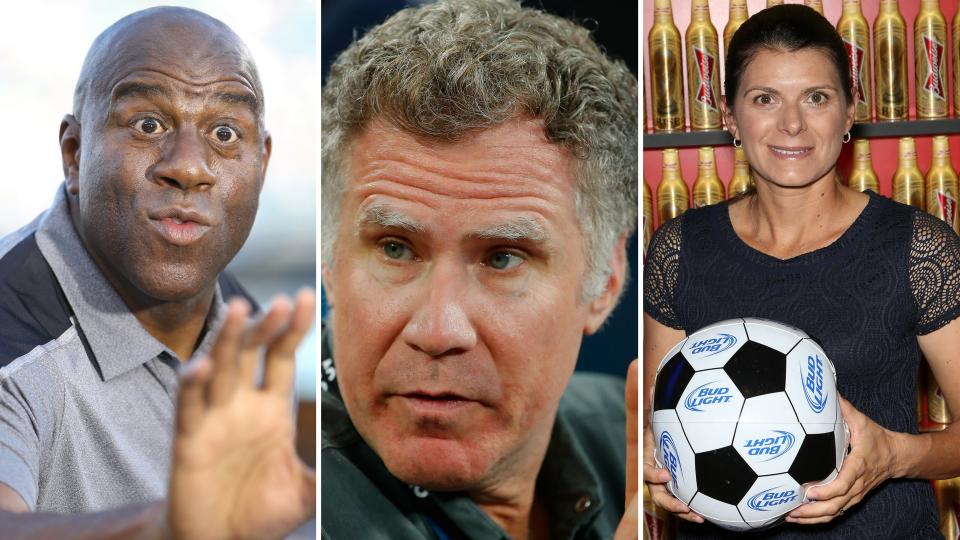Will LAFC, the team owned by celebrities, take MLS to another level?

Los Angeles is intertwined through the history of Major League Soccer. The arrival of David Beckham in the City of Angels back in 2007 is now viewed as a watershed moment in the development and growth of North American soccer, and it was the LA Galaxy that the former Manchester United and Real Madrid midfielder signed for. In a footballing sense, Beckham put LA on the map.
Now, though, there is another team set on usurping the Galaxy as Los Angeles’ soccer superpower. LAFC are bold, brash and ambitious, and this weekend they will kick off their inaugural season as an MLS club. For many, this is the sign of the league’s growing maturity. This marks the start of a new phase in MLS history.
LAFC, owned by a consortium of celebrities that includes Will Ferrell, Magic Johnson, Mia Hamm-Garciaparra and Tony Robbins among others, have big plans. Their new $350 million home, the Banc of California Stadium, will open in April, with Mexican striker Carlos Vela already signed, former US national team coach Bob Bradley appointed and more big-name players sure to arrive over the coming months and years. Zlatan Ibrahimovic is one who has been heavily linked.
Galaxy rivals
But Los Angeles Football Club, to give them their full name, are taking a grander, wider look of the landscape. For all the success that the LA Galaxy have enjoyed over the years, winning more MLS Cups than any other side, including three in four years between 2011 and 2014, the club has long struggled to truly capitalise on its local community. Los Angeles is considered a footballing hotbed, a swirling pot of different cultures all brought up on the beautiful game, yet attendances at StubHub Center have never really reflected that.
READ MORE: Usain Bolt’s football story wasn’t what anyone expected
READ MORE: Arsenal pick candidates to replace failing Arsene Wenger
READ MORE: Gary Neville right to hammer spineless Arsenal
This is primarily where LAFC want to be different. They too have their sights set on silverware and trophies, but it’ll all be for nothing if it doesn’t coincide with the cultivation of a vibrant, abundant soccer community.
They can certainly help MLS in the next stage of its development
They have already made some progress, with their new downtown stadium already giving them a leg up on the Galaxy, who play their home games at a ground set in a suburban sports complex. In many ways, LAFC have positioned themselves as the anti-LA Galaxy and the location of the two clubs’ stadiums is a big part in that.
Of course, it will be difficult to build a fanbase from nothing. There once was another MLS side in Los Angeles, with Chivas USA (an affiliate of the Mexican club Chivas) playing in the city for 10 years between 2004 and 2014 and there are early signs that LAFC have managed to appeal to a section of the old club’s support. Beyond that, LAFC are dependent on fans either ditching the LA Galaxy or taking up an interest in a MLS team from scratch. It might take time for them to reach full fruition as a club.

Carlos Vela is interviewed about his arrival at LAFC
But then many believed that about Atlanta United, who like LAFC entered MLS as a new franchise last year. Yet within months, they were drawing crowds of over 70,000 to their home games. Never before has there been such an opportunity for MLS to capitalise on the growing interest in the sport in the USA and Canada.
MLS progress
The introduction of LAFC represents the next step in this progression. MLS still lacks that one transcendental team, its very own LA Lakers or New York Yankees. The day celebrities are spotted by the paparazzi in the directors boxes, like they are courtside at Staples Center, is the day many will deem MLS to be a truly mainstream pursuit, as misguided as that view may be. But perception is key and LAFC, with its unique mix of glitz and community, will know that.
Whether LAFC can take MLS to another level is debatable. The league is no longer so dependant on individual teams and single teams to market itself. These are not the Beckham years. But as part of the collective, they can certainly help MLS in the next stage of its development – the exploitation of major markets in major cities.
This is a marked departure from the way of previous years, when MLS consciously targeted markets under-served by other major sports, like Portland and Orlando. But this shift in strategy illustrates the ambition the league now holds. That ambition is epitomised by LAFC, the club that isn’t shying away from tackling arguably America’s toughest market of all.


